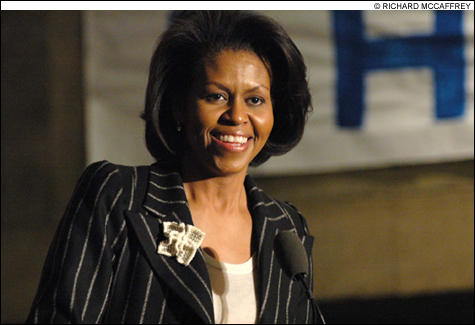
crowd last week at the Community College of Rhode Island’s Warwick campus. |
If Barack Obama proves unstoppable in his pursuit of the Democratic presidential nomination, Hillary Clinton could remember her Rhode Island College rally last Sunday as one of those instances of what might have been. Surrounded by a bevy of local Democratic officials, Clinton bathed in the intense affection of an adoring crowd, her every statement punctuated by wild applause, chants, and a rising sea of blue signs touting her campaign.
As it stands, she might still win Rhode Island’s primary on Tuesday, but don’t count on it. Obama’s cash-swelled campaign is making an aggressive push here, mixing an energetic grassroots effort on the ground with a three-to-one spending advantage on radio and television advertising. Building on a higher national youth vote in 2004, surging local voter enrollment can also be expected to benefit the Illinois senator.
On Monday, the Clinton campaign got some good news when a Rasmussen Reports survey conducted two days earlier, of more than 1000 Rhode Island Democratic primary voters, showed Clinton with a 15-point lead over Obama, 53 percent to 38 percent, with almost 10 percent undecided. An earlier poll in February by Brown University’s Darrell West showed Clinton with 36 percent, Obama with 28 percent, 27 percent uncommitted, and nine percent undecided.
Naturally, Obama campaign manager David Plouffe, during a conference call with reporters on Monday, downplayed the Rasmussen results, expressing his belief that the Rhode Island race is closer and tightening. This wouldn’t be surprising, considering how Obama has wiped out big deficits in other states and captivated a broad swath of Rhode Islanders with his initial opposition to the war in Iraq and his charismatic message of change.
That Clinton spent most of the day here last Sunday — with Bill Clinton due to visit Bryant University in Smithfield on Thursday, February 28 — shows just how much things have changed in a place where, as US Senator Sheldon Whitehouse, Clinton’s local campaign co-chair, said during the RIC rally, the Clintons should be considered honorary Rhode Islanders.
The allotment of time, with higher-stakes battles playing out on March 4 in Texas and Ohio (as well as Vermont) offers backing for Plouffe’s assertion that Clinton’s campaign considers the Ocean State a must-win.
Even if Clinton does prove victorious in Rhode Island next Tuesday, it would take a remarkable upset in the other contests that day to put her presidential aspirations back on track. (At press time, Obama is slated to visit on Saturday, March 1.)
Just as improbable as the challenge facing Clinton in a one-time bastion of support is the way in which the smallest state — thanks mostly to a happy accident — is playing an important role in this hard-fought Democratic presidential contest.
When Governor Donald L. Carcieri vetoed a legislative effort last year to place Rhode Island with the large number of contests on Super Tuesday, no one could have anticipated that the decision would ultimately bring staffers, campaign cash, and visits by even the two remaining Republican presidential contenders.
“It’s really trench warfare for every last delegate,” says Brown’s Darrell West, who calls the level of national attention unprecedented for a Rhode Island primary.
New England has offered some friendly terrain for Clinton’s campaign, with her New Hampshire win temporarily slowing Obama’s momentum, and with a subsequent Super Tuesday victory in Massachusetts demonstrating a reservoir of support for Hillary. The level of enthusiasm for her at the Rhode Island College rally last Sunday made it hard to believe that that morning’s New York Times front-page included the latest in a string of media obituaries for her frontrunner-turned-underdog campaign.
At this point, it’s impossible to completely dismiss Clinton, and her Rhode Island supporters, from the everyday voters who attended her RIC rally to such high-profile backers as former Providence mayor Joseph R. Paolino Jr., remain outwardly optimistic. The wild card for her here could be the women and older voters with solid Democratic voting records who made the difference in her other victories in the region.
Yet as Obama’s seeks to seal the deal, Rhode Island’s small size offers a potential edge to his campaign on the ground. As Plouffe says, “We can conceivably talk to every single voter who we think may participate in the Democratic primary.”